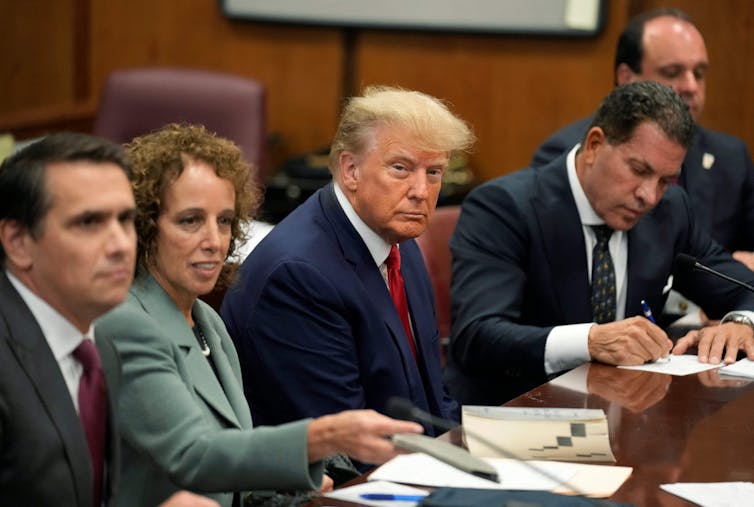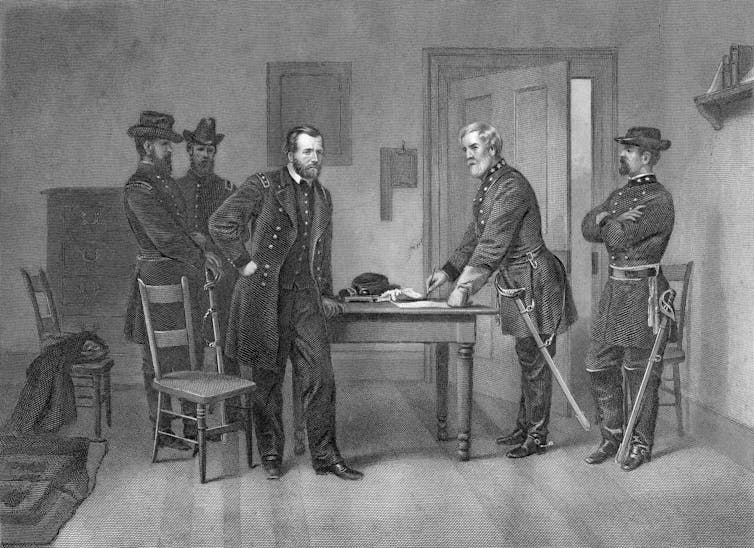This article is part of TPM Cafe, TPM’s home for opinion and news analysis. It was originally published at The Conversation.
In the indictment against former President Donald Trump and his role in the Jan. 6 violent attack against the U.S. Capitol, special prosecutor Jack Smith charged the former president with violating four different federal laws – and Trump pleaded not guilty to each one of them on Aug. 3, 2023.
Three of the charges in United States of America v. Donald J. Trump are fairly easy to understand. They require a jury to determine whether Trump tried to overturn the lawful results of the 2020 election and if he knowingly conspired to obstruct the certification of results on Jan. 6, 2021, all in an attempt to remain in the White House.
But the fourth charge against Trump – of conspiring against the rights of the voters to cast ballots and have them fairly and honestly counted – is more complicated, and it comes from a dark time in U.S. history.
As a historian who studies and writes about democracy and the American South, I believe the 1870s have something to teach us about the fourth count in the Jan. 6 case against Trump.
Ku Klux Klan Acts
The indictment asserts that Trump knowingly conspired “to injure, oppress, threaten, and intimidate one or more persons in the free exercise and enjoyment of a right and privilege secured to them by the Constitution and laws of the United States – that is, the right to vote, and to have one’s vote counted.”
That quote comes from a series of laws enacted in the 1870s called the Ku Klux Klan Acts. They are officially known as the Enforcement Acts because they empowered the federal government to enforce the Civil War amendments – the 13th, 14th and 15th amendments that freed enslaved people and guaranteed equal protection of the laws and the right to vote.
As the Brennan Center for Justice points out, in the 20th century the Supreme Court has ruled that all sorts of election infringements violate the Enforcement Acts, including stuffing ballot boxes and bribing voters. A suspect doesn’t have to commit violence against Black voters to violate the law.

Retreat from democracy
When the Ku Klux Klan tried to steal the 1872 presidential election by killing and intimidating newly enfranchised Black men, federal troops swooped into South Carolina and arrested hundreds of Klansmen. The Department of Justice secured convictions in 140 cases by using the law that is being used to prosecute Trump.
Congress had to expand the attorney general’s staff into an entire department of government to handle the excessive case load.
The Klan prosecutions worked.
The 1872 election was relatively free and fair. In South Carolina, where the Black population outnumbered the white population, President Ulysses Grant, who had commanded the Union Army in the Civil War and led it to victory over the Confederacy, won with 75% of the vote.
After Grant was reelected, many champions of Black rights lapsed into what historians often characterize as a moral fatigue. According to historian Eric Foner’s “Reconstruction: America’s Unfinished Revolution,” a “resurgence of overt racism” in the North triggered a “retreat from Reconstruction.”
The turning point was at Colfax, Louisiana.
Just before Easter in 1873, federal soldiers steamed up Louisiana’s Red River to investigate reports of yet another wave of white terrorism against Black citizens.
As later described by Col. T.W. DeKlyne, as the soldiers approached the town of Colfax, they saw neglected neglected crops and abandoned farmhouses. They followed a trail of corpses to the charred, smoking remains of the courthouse, whose grounds were strewn with more dead bloating in the sun. Some were burnt. Others had been shot, execution style, in the back of the head.
In his history of the Colfax massacre, journalist Charles Lane estimated that between 62 and 81 Black men were killed, most after they surrendered to the white militia.
Despite the bloodshed, Louisiana officials did nothing to hold the murderers accountable.
But federal attorneys indicted 98 men. Nine stood trial, including one William Cruikshank, who Lane described as the “burly, self-confident” plantation owner who had supervised the executions.
Cruikshank was convicted not of murder but of the federal crime of conspiring to violate the civil and voting rights of Americans – the same crime that Trump is charged with.
The case was appealed to the Supreme Court, where justices heard all sorts of arguments on the authorities of state and federal governments to enforce voting rights laws. But the real issue was whether the federal government, 11 years after the end of the Civil War, still had the will to protect the civil rights of Black people.

The Supreme Court set William Cruikshank free, and white supremacists established racist regimes in every Southern state for nearly 100 years thereafter.
According to Nicholas Lemann, professor emeritus at Columbia University, the Civil War did not end in 1865 at Appomattox Court House – the Virginia village where Confederate Gen. Robert E. Lee surrendered his forces to Union Gen. Ulysses S. Grant.
The last battle, he contends, was fought at Colfax, and the South won. The South staged unfair elections for the nearly the next 100 years. Not until the Voting Rights Act of 1965 did the federal government signal it would force states to hold free and fair elections.
Civil War amendments today
The latest retreat by the Supreme Court from defending Black civil rights might have begun in 2013, in its Shelby County v. Holder ruling, in which the justices abolished a key part of the 1965 Voting Rights Act that ensured federal oversight of voting rules in areas with a history of discrimination. The 5-4 majority held that states could be trusted to guarantee citizens’ voting rights.
Writing in dissent, Justice Ruth Bader Ginsburg compared enforcing the Civil War amendments to “battling the Hydra,” the multiheaded monster that sprouted new heads after one was defeated.
In North Carolina, for instance, the Republican lawmakers tried to put what is known as the “independent state legislature theory” into practice. That theory holds that state legislatures are the supreme authority in federal elections.
But in the Moore v. Harper case, Chief Justice John Roberts disagreed and wrote in the 6-3 majority opinion on June 27, 2023, that the “federal court must not abandon their own duty to exercise judicial review” over elections.
Given this long history of advance and retreat, it’s not surprising, then, that special counsel Jack Smith, in his use of a law to prosecute Trump that dates back to the Reconstruction Era’s laws protecting the Black vote, has reasserted the Department of Justice’s power to enforce the Civil War amendments.
This article is republished from The Conversation under a Creative Commons license. Read the original article.







Any word on the churches that explicitly endorsed the actions of the KKK and under whose aegis they led a terrorist persecution of American citizens?
The burning crucifix wasn’t a giveaway!?
Speaking only for myself, the KKK Acts were never mentioned during my time in law school. How delightful to find them still on the books 150 years later.
This is more than a little ironic – having to return to enforcing laws that were originally passed by Republicans to protect blacks, to now protect blacks and other right wing targets from current Republicans.
Alex Wagner had some guests on last night that talked about the through-line of this, from the Enforcement Acts of the 1870s, to Mango Mussolini’s dad Fred Trump being arrested at a KKK riot in Queens NY in the late 1920s, to the animating and violent actions attempted by Trump and his crooked counsel/toadies to nullify votes in the Capitol on Jan. 6th, particularly in key swing states like GA, to Trump holding his first public appearance/rally after being arrested this week, in Alabama, a state which is actively and currently defying even our current hard-right SCOTUS court which ruled earlier this year that even Alabama’s racist gerrymandered Congressional map was too racist to be legal.
Odd how the KKK never burns a Darwin “Evolve” Fish symbol on the lawns of black people they are terrorizing.